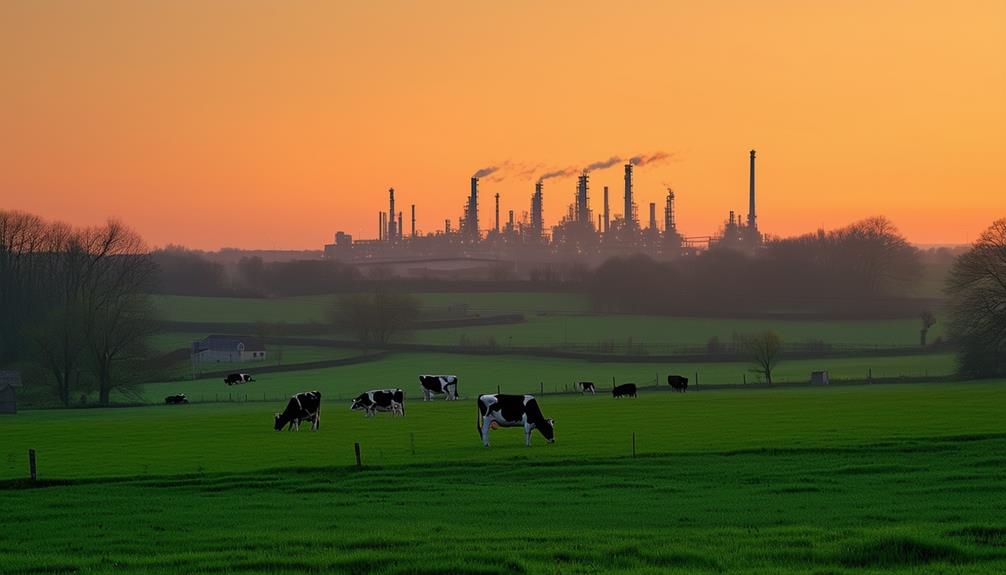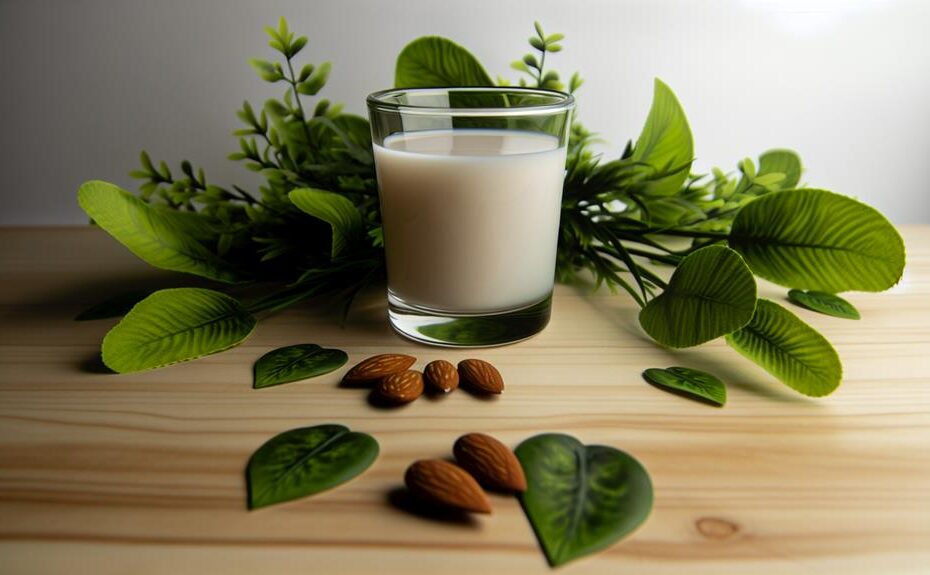As you navigate the world of plant-based living, you may assume skim milk is a harmless part of your diet. However, you might be surprised to learn that it's not considered vegan. Derived from cow's milk, skim milk contains lactose and animal proteins, making it a non-starter for those committed to excluding animal-derived products. But what exactly makes skim milk non-vegan, and what alternatives can you turn to instead? The truth behind skim milk's production and composition might just challenge your understanding of veganism – and it's about to get a lot more complicated.
Skim Milk's Vegan Roots
As you navigate the world of plant-based diets, it's important to grasp that skim milk, despite its name, has no roots in veganism whatsoever. In fact, skim milk is a dairy product derived from cow's milk, making it non-vegan. Veganism, by definition, excludes all animal-derived products, and skim milk is no exception. This might come as a surprise, especially given the 'skim' label, which might imply a healthier or more plant-based option.
However, don't be fooled – skim milk still contains lactose and animal proteins, making it unsuitable for a vegan diet. If you're looking for a vegan alternative, you might consider plant-based options like almond milk, soy milk, or oat milk. These alternatives mimic the creamy texture and taste of skim milk without the animal-derived ingredients.
Understanding the non-vegan status of skim milk is important for making informed choices when selecting dairy alternatives. By being aware of what's in your food, you can make sure that your diet aligns with your values and lifestyle.
Milk's Lactose Hurts Vegans
As you navigate the world of veganism, you're likely to encounter skim milk, which can be a problem due to its lactose content.
You might be wondering why this sugar is such a significant matter – after all, don't some people just have lactose intolerance?
The thing is, lactose can cause digestive issues in vegans who consume it, making it an important consideration in their food choices.
Fat Content Affects Veganism
As you delve into the world of veganism, you'll quickly realize that skim milk isn't a suitable option for those who follow this lifestyle. The fat content in skim milk may be lower than whole milk, but it still contains lactose, a dairy sugar that's not vegan-friendly.
Understanding the implications of fat content on veganism is vital, and it's important to take into account the following factors:
- Low-Fat Variation Affects Veganism
- Reduced Lactose Affects Veganism
- Pasteurization Affects Vegan Status
Low-Fat Variation Affects Veganism
You might assume that skim milk, with its low-fat content, is a harmless supplement to a vegan diet, but its lactose content tells a different story.
As a vegan, you may think skim milk is a safe bet, but its animal-derived lactose raises concerns.
Even with minimal fat, skim milk's dairy origins can be a deal-breaker for those committed to a plant-based lifestyle.
Reduced Lactose Affects Veganism
Milk's lactose content, even in reduced amounts, hurts vegans who prioritize a plant-based lifestyle free from animal-derived products.
You might think skim milk's lower lactose levels make it vegan-friendly, but that's not the case. As a dairy product derived from cow's milk, skim milk doesn't align with vegan principles.
Opt for plant-based alternatives to adhere to your lifestyle choices.
Pasteurization Affects Vegan Status
When considering skim milk's vegan status, it's important to separate the pasteurization process from the lactose content, as the former doesn't compromise vegan principles, whereas the latter is a deal-breaker.
You should know that pasteurization, a process that kills bacteria, doesn't involve animal products, making it vegan-friendly.
It's the lactose, derived from animals, that makes skim milk non-vegan.
Lactose-free Skim Milk Formula
As you navigate the world of lactose-free skim milk formula, you'll notice that it's not as vegan-friendly as you might think. Despite the lack of lactose, this type of milk still comes from cow's milk, making it non-vegan.
Let's break down the specifics of this formula, including its key components.
- Microfiltered lactase enzyme added to break down lactose
- Vitamin D3 fortification agent, which may be derived from animal sources
- Calcium carbonate fortification agent, which can be problematic for vegans
Microfiltered Lactase Enzyme Added
By adding microfiltered lactase enzyme to skim milk, you can break down lactose, making it a suitable option for those who struggle with lactose intolerance.
This lactose-free skim milk formula is perfect for vegans seeking a dairy alternative without lactose.
With lactase enzyme, you can enjoy milk's benefits without discomfort, making it a convenient option for those with lactose intolerance.
Vitamin D3 Fortification Agent
You need to be aware that Vitamin D3, a common fortification agent in skim milk, is often derived from lanolin, a non-vegan source, making it unsuitable for a plant-based diet.
This means that most skim milk products fortified with Vitamin D3 aren't vegan-friendly.
However, you can opt for lactose-free skim milk formulas fortified with vegan-friendly Vitamin D sources or choose plant-based milk alternatives like almond or oat milk.
Calcium Carbonate Fortification Agent
Fortifying lactose-free skim milk formulas with calcium carbonate provides vegans with a suitable alternative to traditional dairy products, aligning with their ethical values.
As a vegan, you can choose lactose-free skim milk fortified with calcium carbonate, which is a common vegan-friendly fortification agent, ensuring you receive vital nutrients without compromising your values.
Hormone Use in Production

When examining the production of skim milk, you'll want to take into account the use of hormones in dairy farming.
Some conventional dairy farmers use synthetic hormones like recombinant bovine growth hormone (rBGH) to increase milk production, but these hormones have raised concerns about animal welfare and human health.
Gelatin in Skim Milk
As you investigate the world of skim milk, you might be wondering about the role of gelatin in its production. Specifically, you're probably curious about the use of hormones in milk production and how it relates to gelatin.
Let's take a closer look at the connections between these factors.
- Rennet from animal stomach
- Casein from cow's milk
- Whey protein isolate powder
Rennet From Animal Stomach
When you investigate the production process of skim milk, you may be surprised to find that some manufacturers use rennet, an enzyme extracted from the stomach lining of calves, which raises concerns about the vegan-friendliness of this dairy product.
This animal-derived ingredient is a red flag for vegans, making it crucial to scrutinize labels and opt for dairy-free alternatives.
Casein From Cow's Milk
You'll often find casein, a milk protein derived from cow's milk, lurking in skim milk products, making them non-vegan.
This milk protein is a major contributor to skim milk's non-vegan status.
The use of hormones in cow's milk production raises ethical concerns for vegans, and gelatin is sometimes added, further disqualifying skim milk from being vegan.
Whey Protein Isolate Powder
Whey protein isolate powder, a derivative of cheese production, sneaks its way into skim milk, rendering it non-vegan due to its animal-derived origin.
You might be surprised to learn that this powder is often added to skim milk to improve its nutritional profile. However, this means that skim milk isn't suitable for a vegan diet.
Microbial Rennet Alternative Used
As you journey into the world of vegan skim milk, you'll find that microbial rennet is a game-changer. This progressive alternative to traditional animal-derived rennet isn't only cruelty-free but also sustainable.
By choosing products made with microbial rennet, you're supporting a kinder, more eco-friendly approach to cheese production.
- Fungal-based coagulant alternative
- Bacterial coagulant enzyme added
- Cellulase from fungal source
Fungal-Based Coagulant Alternative
One significant breakthrough in vegan-friendly dairy production is the use of fungal-based coagulants, which eliminates the need for animal rennet and hormone use in skim milk production.
You can enjoy dairy products without compromising your values, as fungal-based coagulants support ethical and sustainable practices. By choosing skim milk made with microbial rennet, you're promoting cruelty-free options.
Bacterial Coagulant Enzyme Added
You can make a more informed decision about the skim milk you buy by looking into the production process, especially regarding the bacterial coagulant enzyme added to facilitate curdling. Some producers use microbial rennet alternatives, eliminating the need for animal-based hormones, making it a more vegan-friendly option.
| Coagulant Type | Source | Vegan-Friendly |
|---|---|---|
| Animal-derived | Animal stomach lining | No |
| Microbial rennet | Bacteria | Yes |
| Fungal-based | Fungi | Yes |
| Plant-based | Plants | Yes |
| Traditional rennet | Animal stomach lining | No |
Cellulase From Fungal Source
Turn to cellulase from a fungal source, a microbial rennet alternative that's gaining traction in cheese production, and you'll find a hormone-free solution that's paving the way for vegan-friendly cheese options.
This enzyme breaks down cellulose in plant material, aiding in flavor extraction during cheese production, and helps coagulate milk without using hormones.
Sodium Caseinate Emulsifier Added
Sodium caseinate, a milk-derived emulsifier, is often added to skim milk, rendering it non-vegan despite the use of microbial rennet alternatives that avoid hormone use in production.
As you investigate vegan options, be aware that sodium caseinate is a milk protein, making it non-vegan. Look for plant-based alternatives like almond milk or oat milk instead.
Skim Milk's Hidden Animal Byproduct
Every carton of skim milk contains a hidden animal byproduct: lactose, a sugar derived from cow's milk that's often used as a binding agent in different food products.
You might think skim milk is harmless, but it's still a dairy product that contributes to the dairy industry and involves animal exploitation. As a vegan, you're likely aware that lactose is an animal byproduct, making skim milk non-vegan.
When you choose to avoid skim milk, you're making an ethical choice to reject animal cruelty and the environmental impact of dairy farming. You're not alone – many vegans opt for plant-based alternatives like almond milk, soy milk, or oat milk instead. These options not only align with your values but also offer a cruelty-free alternative to skim milk.
Conclusion
So, you've learned that skim milk isn't vegan, despite its name suggesting otherwise. This is because it comes from cow's milk, containing lactose and animal proteins.
When choosing a milk alternative, opt for plant-based options like almond, soy, or oat milk that mimic skim milk's texture and taste.
By making informed decisions, you can guarantee your commitment to a vegan lifestyle and exclude all animal-derived products from your diet.
